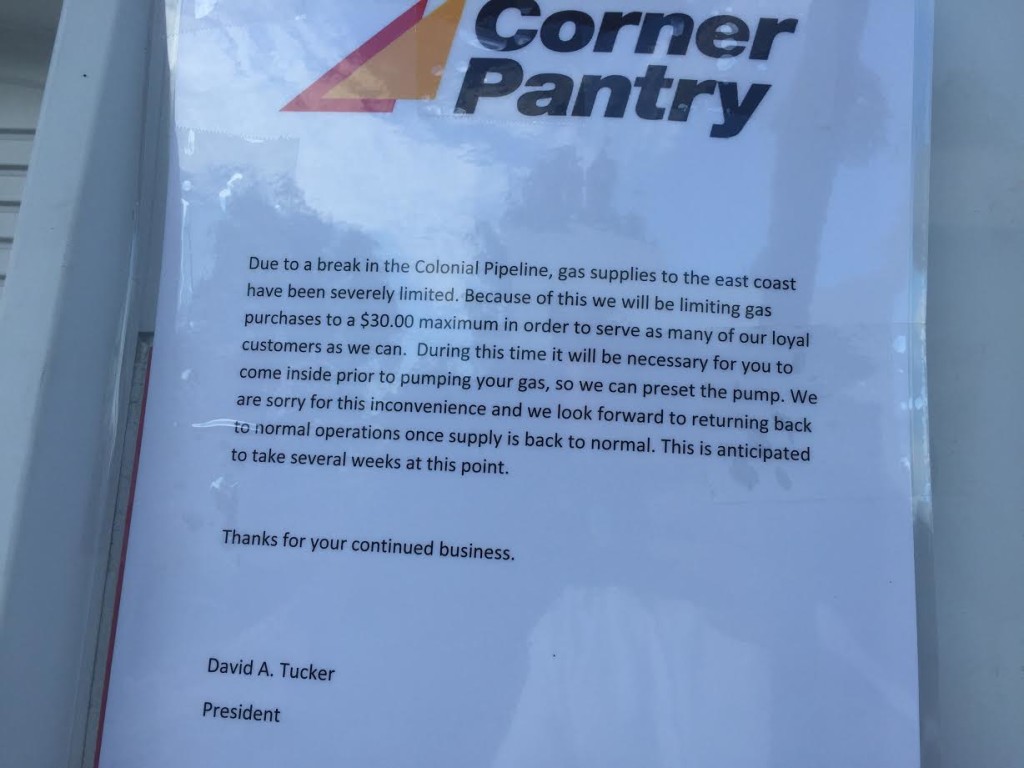If memory serves, I think the first I heard about the problems regarding gas prices/scarcity was on my favorite morning program, “Morning Joe.” It was a blub about something going on with the Colonial Pipeline. “Well that’s not good”, I thought.
Fast forward a day or so and I ran into this letter taped to a local gas pump at a popular Corner Pantry (Corner of Forest and Beltline).
While I didn’t go inside, and to my knowledge the machine would not have stopped at “$30,” I subscribed to the high road/honor system and stopped at 30 bucks
Did I have to stop at 30 bucks? “No.” (Not at this particular pump.) Do I drive a Suburban and need gas as a dad and Realtor? “Yes!”
Didn’t care…
First – I get it, and I’m a nice guy, so… Second – I’m a team player, perhaps to a fault. I’m good with it. Moreover – I know David Tucker is a pillar of our community and he took the time to put that note on his gas pumps. Further still – there’s a reason for that note.
There you go..
Flip the thinking; A suburban is like candy for a gas station, yet he’s asking everyone, including suburbans, to top out at $30. Is he doing this because he knows another $30 car is behind my $30 vehicle? I’m going with,”No.” Reason 1: He’s didn’t need to do what he did. He could have let everyone fill up with whatever they wanted, and charge what he wanted. Reason 2: Repeat Reason #1.
For an update regarding the condition and immediate future of the Colonial Pipeline, see article below.
Thank you!
Franklin
Alabama Pipeline Restarts: When Will Gas Prices Go Down?
By Leada Gore | lgore@al.com
First, the good news.
Colonial Pipeline’s Line One has restarted, restoring the flow of gasoline to the East Coast.
Now for the bad.
It’s going to take several days for fuel prices to go back down and for supply levels to reach pre-leak levels.
The pipeline leak, discovered Sept. 9, dumped some 250,000 gallons of gasoline near Helena in central Alabama. Patrick DeHaan, fuel analyst for tracking site gas GasBuddy.com, said the disruption kept 15 million barrels of gasoline – or 655 million gallons – from being shipped to destinations along the East Coast. The result has been higher prices in Southeastern states, particularly Georgia, North Carolina and Tennessee.
“Since the shutdown, gasoline deliveries have all but halted and inventories at local gasoline racks have quickly been depleting as panicked motorists fill their tanks, leading to gas price spikes, supply outages and headaches in six primary states: Alabama, Georgia, North Carolina, South Carolina, Tennessee and Virginia,” DeHaan said.
Georgia has been one of the states hardest hit by the price hikes, with a gallon of gas up 26 cents in the last week to $2.37. Metro Atlanta has seen even higher prices, up 31 cents to $2.50 a gallon. In Tennessee, gasoline is up 16 cents from last week to $2.16 per gallon. Metro Nashville is up 25 cents to $2.30 per gallon. North Carolina prices are up 17 cents per gallon to $2.22 per gallon.
Gas prices in South Carolina are up 8 cents over last week; Virginia has seen a 12 cent increase per gallon.
In Alabama, the average price of a gallon of regular gasoline is $2.07, up 13 cents from last week. The highest costs were in Cherokee and Tallapoosa counties, each reporting $2.21 per gallon.
The pipeline leak caused a spike in gas prices at a time when they normally go down. Nationally, the average price of a gallon of gas is $2.21 per gallon, up 3 cents from last week.
The restart of the line is the first step towards sending the prices back down but drivers may take have to wait two to four weeks to see changes at the pump.
“Gasoline availability will improve,” he said. “Gas prices won’t immediately.”
How to find the cheapest gas in your area
Gas shortages
In addition to higher prices, some states are reporting shortages of fuel.
On Wednesday, 772 stations in North Carolina were out of fuel as compared to 61 in Georgia, 30 each in South Carolina and Tennessee and three in Alabama. The numbers have fallen overnight, particularly in the states closer to shipping sites.
Colonial Pipeline said it worked around-the-clock to construct a bypass for the line in an effort to restore supplies.
“It is expected to take several days for the fuel delivery supply chain to return to normal,” the company said. “Some markets served by Colonial Pipeline may experience, or continue to experience, intermittent service interruptions. Colonial continues to move as much gasoline, diesel and jet fuel as possible and will continue to do so as markets return to normal.”




Speak Your Mind